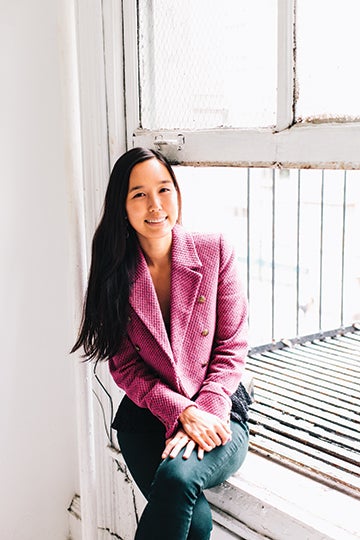Justice and Healing
Michelle Tran is helping the most vulnerable fight cancer and overcome hate.

For Michelle Tran ’18, practicing medicine and activism go hand in hand.
After graduating from Rice with majors in biochemistry and cell biology and poverty, justice and human capability, the Sid Richardson alumna went on to the M.D./Ph.D. program at the Icahn School of Medicine at Mount Sinai, where she’s focusing on oncology.
She was admitted to the Icahn School’s FlexMed program during her sophomore year at Rice, which guaranteed her a spot in the medical school while encouraging her to study more broadly and get involved in Rice’s Center for Civic Leadership.
“I knew that I wanted to do research in some capacity before I applied to the program. But after I got in, I got to go further into it,” Tran says. “Combined with the research I was doing at MD Anderson, I was really interested in combining clinical care with research to translate discoveries into clinical trials that could be brought to patients.” After arriving in New York during the height of the pandemic, Tran found a second purpose: to help the most vulnerable members of the Asian American and Pacific Islanders (AAPI) communities protect themselves against violent, racist attacks.
Since March 2020, there have been 9,081 hate incidents against AAPI people in the U.S., according to the organization Stop AAPI Hate. And New York City saw the largest increase in those attacks, according to The New York Times.
“I remember people in the subway trying to go to the opposite side of the car, giving a strange look, and people calling my boyfriend racist slurs,” she says. “And unfortunately, things just escalated from there and violent acts started happening against folks in circles closest to me.” Tran attended marches and protests, but she knew there was more to be done.
In March 2021, along with Tiffany Yuen, a mentee of Tran’s through Apex for Youth (an organization that works with underserved Asian and immigrant youth from low-income families in New York City), she launched Soar Over Hate. The goal was to raise about $3,000 via GoFundMe to purchase and distribute personal alarms, whistles and pepper spray to the most vulnerable members of the AAPI community — including the elderly and those who don’t speak English. Within about a day, they’d doubled their financial goal.
As of press time, more than $100,000 has been donated to the organization, allowing Soar Over Hate to distribute 23,000 protective devices, mainly through events in New York and California that drew thousands of concerned community members. They’ve since expanded their scope by launching two new initiatives: a scholarship for low-income rising 12th graders in New York City and a fund for victims to receive counseling from culturally competent Asian American therapists. And of course, Tran is balancing all of this with the demands of her academic program, too. How? It all goes back to her intention.
“The reason why I started this program is because I wanted to help my community and get better connected,” she says. “And I think medicine is a lot about that — one on one, helping an individual heal.”
— Laura Furr Mericas
